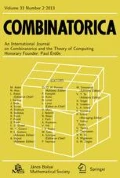We show that if a language has an interactive proof of logarithmic statistical knowledge-complexity, then it belongs to the class . Thus, if the polynomial time hierarchy does not collapse, then -complete languages do not have logarithmic knowledge complexity. Prior to this work, there was no indication that would contradict languages being proven with even one bit of knowledge. Our result is a common generalization of two previous results: The first asserts that statistical zero knowledge is contained in [11, 2], while the second asserts that the languages recognizable in logarithmic statistical knowledge complexity are in [19].
Next, we consider the relation between the error probability and the knowledge complexity of an interactive proof. Note that reducing the error probability via repetition is not free: it may increase the knowledge complexity. We show that if the negligible error probability is less than (where k(n) is the knowledge complexity) then the language proven is in the third level of the polynomial time hierarchy (specifically, it is in ). In the standard setting of negligible error probability, there exist PSPACE-complete languages which have sub-linear knowledge complexity. However, if we insist, for example, that the error probability is less than , then PSPACE-complete languages do not have sub-quadratic knowledge complexity, unless .
In order to prove our main result, we develop an AM protocol for checking that a samplable distribution D has a given entropy h. For any fractions , the verifier runs in time polynomial in and and fails with probability at most to detect an additive error in the entropy. We believe that this protocol is of independent interest. Subsequent to our work Goldreich and Vadhan [16] established that the problem of comparing the entropies of two samplable distributions if they are noticeably different is a natural complete promise problem for the class of statistical zero knowledge ().
Similar content being viewed by others
Author information
Authors and Affiliations
Additional information
Received January 6, 2000
RID=" "
ID=" " This research was performed while the authors were visiting the Computer Science Department at the University of Toronto, preliminary version of this paper appeared in [27]
RID="*"
ID="*" Partially supported by Technion V. P. R. Found––N. Haar and R. Zinn Research Fund.
RID="†"
ID="†" Partially supported by the grants OTKA T-029255, T-030059, FKFP 0607/1999, and AKP 2000-78 2.1.
Rights and permissions
About this article
Cite this article
Petrank, E., Tardos, G. On the Knowledge Complexity of . Combinatorica 22, 83–121 (2002). https://doi.org/10.1007/s004930200005
Issue Date:
DOI: https://doi.org/10.1007/s004930200005




